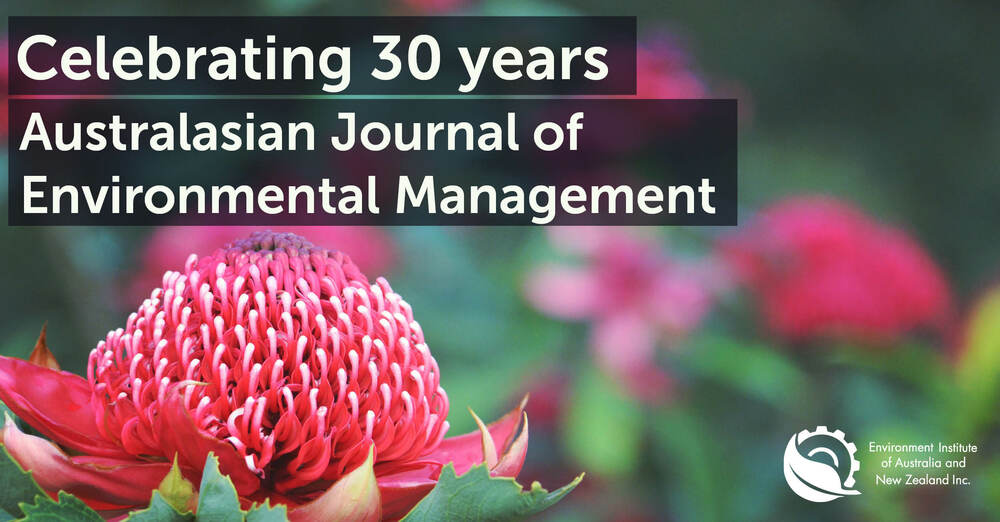-
Member Login
- Home
- About
- Institute Groups
- Australian Divisions
- New Zealand Chapter
- Special Interest Sections
- Communities of Practice
- Membership
- Events
- News & Publications
- Institute Programs
- Resources
- Jobs Board
- Contact Us
- Site Info
Celebrating 30 years of AJEM

This month marks 30 years of EIANZ's peer-reviewed journal, the Australasian Journal of Environmental Management (AJEM).
Founded in 1994, AJEM addresses general issues of policy and practice in resource and environmental management with a focus on Australia and Aotearoa New Zealand. The journal is published four times per year and regularly highlights particular topics of interest with special issues on areas such as heritage and environmental management, ecology and conservation, and Indigenous water management.
Emeritus Professor Helen Ross HLMEIANZ wrote a fascinating history of the journal to date for her final editorial as Managing Editor in 2023, which is available to read here.
To mark 30 years of outstanding publishing, EIANZ turned to AJEM editors and board members for perspectives on the journal's evolution, and advice for aspiring authors:
Emeritus Professor Stephen Dovers MEIANZ, AJEM Associate Editor 1994-current
‘When we started the journal (against the expectations of many), there was nowhere to publish quality, peer-reviewed practice-oriented articles on Australian (now Australasian) environmental management. There is now, and AJEM is both respected and very useful. It has been central to the coming of age of our profession.’
Dr Geoff Syme, AJEM Editorial Advisory Board member, 1994-current
‘One of my roles with AJEM has been to serve for a number of years on the panel selecting the annual “best paper” award. The growth in the quality and diversity of research was clearly evident over time. The evolution to wider variety in disciplinary focus and increased attention to integrated approaches has helped create a vibrant community of practice across Australasia.’
Dr Animesh Kumar Gain MEIANZ, Editor, 2023-current
‘The environmental landscape is dynamic, necessitating equally adaptive approaches to its management and comprehension. Recognising this, one of my primary goals as editor is to ensure that AJEM evolves in tandem with the latest developments, technologies, and frameworks in environmental management. This means embracing interdisciplinary research, integrating Indigenous knowledge and practices, and highlighting innovative nature-based solutions that promise sustainability and adaptability in the face of changing global conditions. The strength of AJEM lies not just in the quality of articles we publish but in the vibrancy and diversity of our community of researchers, practitioners, policymakers, and educators.’ (From Dr Gain's inaugural editorial, available here).
Emeritus Professor Helen Ross HLMEIANZ, Managing Editor, 2005-2023
‘On reviewing the – probably – 32 editors' tips we have written [for AJEM] since 2011, I think the most important point, among many, is to consider carefully what contribution you seek to make to knowledge, then be clear in communicating that. This is the ‘so what’ question. Journal publications focus more strongly than professional reports on new contributions to knowledge, and on building the body of evidence - hence support for others’ findings, where more evidence is needed, and contradiction of previous findings. All authors need to highlight the new knowledge they contribute, amidst the points they could potentially report.’ (From Professor Ross's final editorial, available here.)
EIANZ would like to congratulate all those who have contributed to the success of AJEM as editors, board members, reviewers and authors. Here's to the next 30 years!
A subscription to AJEM is included in Full and Fellow membership of EIANZ. Members can access issues of the journal via the Member Centre.
We acknowledge and value the rights and interests of Indigenous Peoples in the protection and management of environmental values through their involvement in decisions and processes, and the application of traditional Indigenous knowledge.

